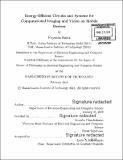Energy-efficient circuits and systems for computational imaging and vision on mobile devices
Author(s)
Raina, Priyanka
DownloadFull printable version (17.44Mb)
Other Contributors
Massachusetts Institute of Technology. Department of Electrical Engineering and Computer Science.
Advisor
Anantha Chandrakasan.
Terms of use
Metadata
Show full item recordAbstract
Eighty five percent of images today are taken by cell phones. These images are not merely projections of light from the scene onto the camera sensor but result from a deep calculation. This calculation involves a number of computational imaging algorithms such as high dynamic range (HDR) imaging, panorama stitching, image deblurring and low-light imaging that compensate for camera limitations, and a number of deep learning based vision algorithms such as face recognition, object recognition and scene understanding that make inference on these images for a variety of emerging applications. However, because of their high computational complexity, mobile CPU or GPU based implementations of these algorithms do not achieve real-time performance. Moreover, offloading these algorithms to the cloud is not a viable solution because wirelessly transmitting large amounts of image data results in long latency and high energy consumption, making them unsuitable for mobile devices. This work solves these problems by designing energy-efficient hardware accelerators targeted at these applications. It presents the architecture of two complete computational imaging systems for energy-constrained mobile environments: (1) an energy-scalable accelerator for blind image deblurring, with an on-chip implementation and (2) a low-power processor for real-time motion magnification in videos, with an FPGA implementation. It also presents a 3D imaging platform and image processing workflow for 3D surface area assessment of dermatologic lesions. It demonstrates that such accelerator-based systems can enable energy-efficient integration of computational imaging and vision algorithms into mobile and wearable devices.
Description
Thesis: Ph. D., Massachusetts Institute of Technology, Department of Electrical Engineering and Computer Science, 2018. Cataloged from PDF version of thesis. Includes bibliographical references (pages 125-127).
Date issued
2018Department
Massachusetts Institute of Technology. Department of Electrical Engineering and Computer SciencePublisher
Massachusetts Institute of Technology
Keywords
Electrical Engineering and Computer Science.